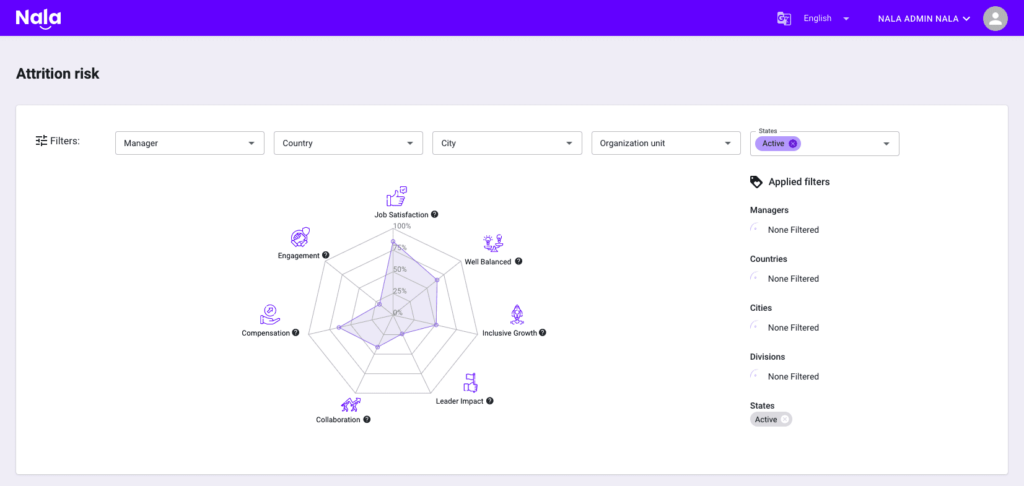By Doreen Hemlock
Keeping top talent is always a concern for businesses, and more so nowadays because of the Great Resignation, a shift to home offices and competition for remote staff from companies globally.
A Miami-based startup aims to help. Nala offers a software platform that quickly surveys employees, peers and managers; analyzes responses; and suggests ways to boost employee satisfaction – all in real-time. The platform builds on human-resource models developed by Google, Korn Ferry and other leading businesses. It presents data in easy-to-grasp charts to track how employees perform and feel.
“Think of Nala as a very efficient, virtual assistant that minimizes talent attrition,” says CEO Ximena Paul.
Started in Chile in 2020, Nala already serves some 20 companies in seven countries in Latin America that handle some 5,000 employees. The businesses pay a monthly subscription for the Software-as-a-Service. The venture now is seeking $2 million in seed funds to expand sales and launch in the U.S. market. New funds should increase staff from 13 today to at least 30 by January, says Paul, formerly the CEO of an education tech venture in Miami.
Talent-management: quicker, data-driven, pro-active
The idea for Nala sprouted when human resources-specialist Maria Fernanda Castillo was working as a top HR manager in Colombia for Latin American delivery unicorn Rappi. Castillo wanted a better way to survey thousands of drivers in diverse countries and retain top talent: a system quicker, more data-driven and pro-active, with suggestions on how to retain specific employees. She envisioned software that could show, for example, that employee X wants more responsibility and Y seeks greater flex time.
While in Chile in 2020 with her Chilean engineer husband, Castillo consulted with engineer pal Fabian Prado, founder of Chile’s fintech firm PagaloAsi. Prado offered to help build the new platform. After piloting the software in several countries, the two teamed up this year with Paul, the Chilean engineer in Miami, to help scale up.
“We’re not in the business of digitizing processes from the past,” says Paul, noting that traditional HR projects too often use long surveys and slow analysis to produce outdated information, siloed by departments. “We provide a methodology and tools that let companies iterate into the future.”
Nala uses a five-minute survey of staff monthly to deliver real-time data shared widely. Surveys ask, for instance: Does your manager give feedback at least once a month: always, sometimes or never?
“With the surveys and our scale, we can go to a manager and say: ‘You’re a leader in development, because of these three specific skills your team thinks you can improve on. Here are videos you can watch and articles you can read to improve those skills,” says Colombia-born Castillo. Consistent coaching from frequent 360-degree evaluations can identify top talent and motivate them to stay.
Latina founders in tech: a “Investors are looking why diversity matters
Today, Castillo and Paul run Nala from a co-work space in Miami’s Brickell area. They see opportunity for sales to fellow startups, which tend to scale up fast and need data quickly to track their progress. The women also are keen on sales in industries with high rates of labor turnover, including retail, transport, higher education and healthcare. Nala’s software already comes in three languages: Spanish, Portuguese and English, broadening its potential reach across the Americas and beyond, the women say.
As Latina co-founders in tech, Castillo and Paul are clearly a minority. New to Miami, Castillo says she’s building her self-confidence in pitching to investors, raised in a culture where men tend to be more assertive than women. Paul already has learned from years living in the US, earning her MBA and leading a tech company, how to make strong presentations and seek venture capital.
Indeed, Paul speaks confidently about the benefits of diversity in gender, race and other factors to help companies recruit a broader talent pool, better retain top performers and reach a wider market.
“Right now, it’s good to be a woman in tech,” says Paul. “Investors are looking to back more women.”

- Miami-based People Clerk acquired by larger justice-tech venture - April 5, 2024
- Lessons from accelerators: Nala’s Latin American founders share learnings from Endeavor, eMerge and Techstars Silicon Valley - February 28, 2024
- Miami’s Blackdove highlights digital art for all during Miami Art Week - December 4, 2023




